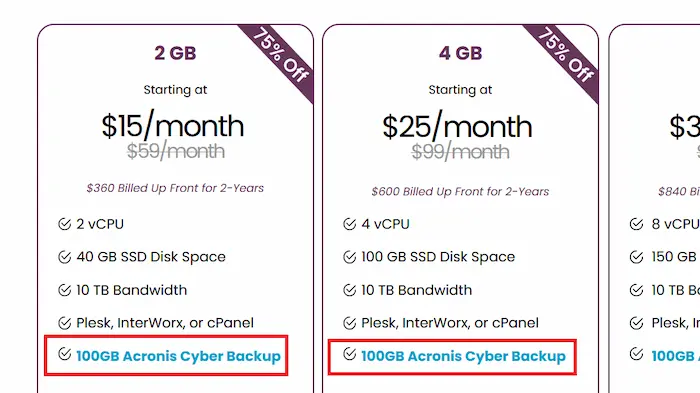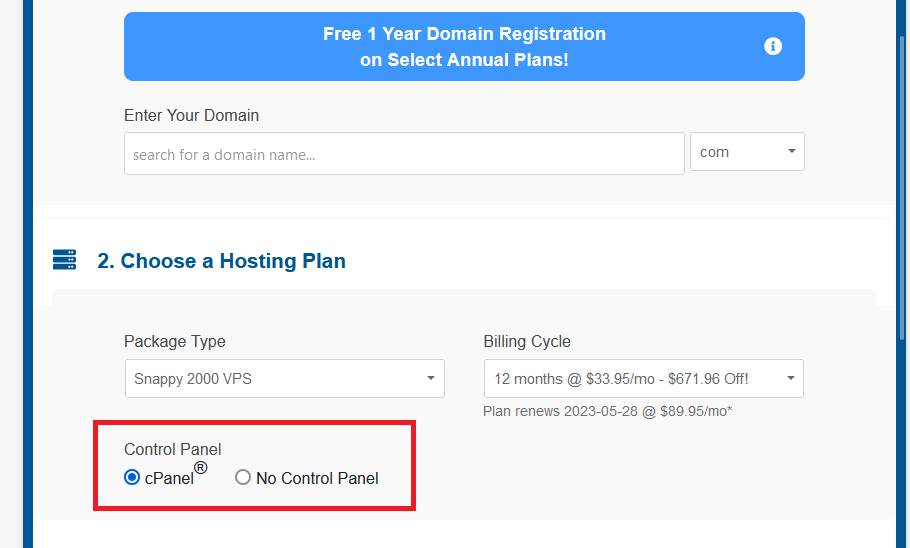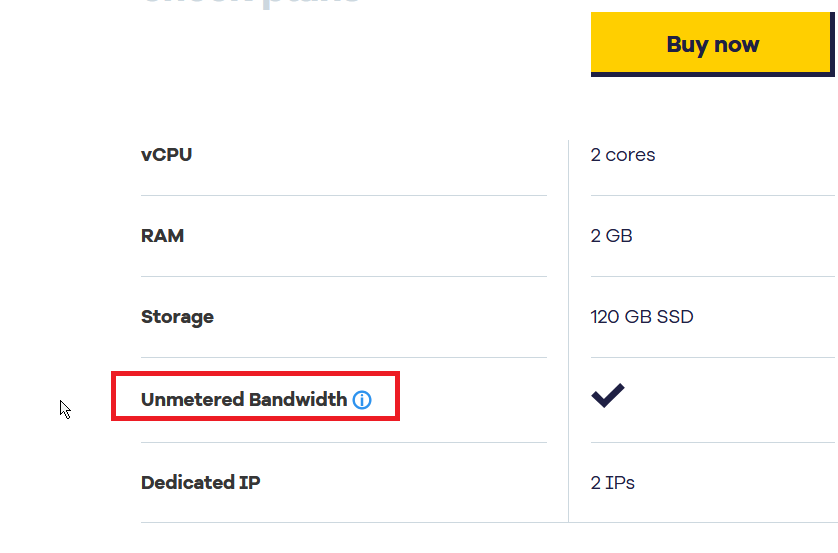Thanks to free Acronis backups and a 100% uptime SLA, Liquid Web is far superior to Hostgator. Liquid Web doesn’t offer shared hosting, so this comparison is for VPS systems. The Hostgator VPS is a terrible deal because it costs more than Liquid Web, has fewer features, and has lackluster compensation for SLA failures compared to the 10x remedy from Liquid Web. So Liquid Web is the clear winner.
Here are the pros and cons of Liquid Web and Hostgator:
Liquid Web Pros:
- Excellent 2-year discounts
- 100 GB free Acronis backups
- 100% uptime SLA guarantee
- Dedicated bandwidth
- Five free cPanel accounts
- Cheap Cloudflare add-on
- Windows hosting options
Liquid Web Cons:
- Lesser storage space
- Only one dedicated IP address
- Lower money-back guarantee
Read the full Liquid Web VPS review to learn more.
Hostgator Web Pros:
- Two dedicated IP addresses
- Lots of storage space
- 45-day money-back guarantee
Hostgator Web Cons:
- Expensive
- Maximum 12-month hosting term
- No backups
- No security
- No free cPanel
- No add-ons
- No SLA good recompense
- No Windows hosting
- No dedicated bandwidth
Read the full Hostgator VPS review to learn more.
Table of Contents
Liquid Web vs Hostgator: Pricing and Coupons
Liquid Web beats Hostgator in pricing. While neither is cheap, Liquid Web costs less than Hostgator, which is surprising, considering that the latter is known for discount hosting. The starting price for Liquid Web’s VPS is $15.00/m, whereas Hostgator costs $19.95/m. To make matters worse, Hostgator has a maximum discount period of 12-months.
Here’s the best Hostgator VPS coupon:
And these are the Hostgator promo codes with deals for all plans.
Liquid Web is not only cheaper than Hostgator, you can extend the discount for a full two years instead of just 12-months, allowing you to maintain the discounted price for twice as long. As a result, the cumulative savings of Liquid Web vastly outpace Hostgator. Here are the Liquid Web coupon codes for all their plans.
Cumulative Savings Over Four Years
This table shows you the cumulative costs of Liquid Web and Hostgator over three years:
| 1 Year | 2 Years | 3 Years | |
|---|---|---|---|
| Liquid Web | $180 | $360 | $1068 |
| Hostgator | $239 | $1199 | $2158 |
As you can see, after three years of hosting, a Liquid Web VPS is two times more expensive than a Hostgator VPS. And we haven’t even factored in the additional cost of add-ons that you will need to buy with Hostgator since it doesn’t come with any backups or security.
In terms of pricing, Liquid Web easily wins this round.
Liquid Web vs Hostgator Pricing Ratings:
Liquid Web Price Rating: ★★★★☆ 4 stars
Hostgator Price Rating: ★☆☆☆☆ 1 star
Winner: Liquid Web
Liquid Web vs Hostgator: Features Comparison
The Liquid Web VPS is crammed with useful features, while Hostgator offers nothing in comparison. Here’s a comparison of what you get with each:
| Feature | Liquid Web | Hostgator |
|---|---|---|
| Free Backups | ✅ | ❌ |
| Free Security | ✅ | ❌ |
| Uptime SLA | 100% | 99.9% |
| Support SLA | ✅ | ❌ |
| Dedicated Bandwidth | ✅ | ❌ |
| Choice of Control Panel | ✅ | ❌ |
| Cloudflare Add-on | ✅ | ❌ |
| Choice of OS | ✅ | ❌ |
| Storage Space | 40 GB – 200 GB | 120 GB – 240 GB |
Liquid Web has almost everything you need, while Hostgator has nothing. Check out the Liquid Web VPS review for more details.
Here’s an in-depth view of the feature comparisons between LiquidWeb and Hostgator.
Liquid Web vs Hostgator: Backups
All Liquid Web VPS plans come with 100 GB of free Acronis backups, as shown here:

Acronis is a backup service that stores your VPS data offsite in real-time. 100 GB space is sufficient to cover a dozen sites easily, and you can take manual backups and restore them from the Liquid Web dashboard at any time. It’s an all-in-one solution for peace of mind.
Hostgator, however, doesn’t help with backups at all. If you purchase the cPanel/WHM add-on, you have to manage the backup schedule on cPanel on your own. These backups will remain on your server unless you make arrangements to migrate them offsite. Plus, they consume your server resources while the backup is in progress.
So with Liquid Web, you have a complete backup solution, whereas, with Hostgator, you have to do everything on your own. There’s a reason why I recommend Liquid Web as the best alternative in my Hostgator VPS review.
LiquidWeb vs Hostgator: Security
All Liquid Web VPS plans come bundled with the “Server Secure” service. This includes the following:
- Firewall protection
- Intrusion protection
- Server hardening
- Security audits
These measures go a long way towards making your server safe. In addition, you can purchase an additional “Server Secure Plus” package with your Liquid Web VPS, including malware and vulnerability scans. By contrast, Hostgator neither offers basic security with its VPS plans nor does it have add-ons so you can plug the gaps. You have to handle everything on your own.
So Liquid Web servers are far more secure than their Hostgator counterparts.
Liquid Web vs Hostgator: Control Panels
Liquid Web VPS servers come with five free cPanel accounts and a choice of alternative control panels like InterWorx. Hostgator doesn’t come with anything, and you need to purchase cPanel separately if you want a control panel at all, as seen in this screenshot:

So not only does Hostgator cost more than Liquid Web, you need to spend extra per month just for the luxury of having a control panel. Not only that, you don’t have an option for any other control panel. At this point, Hostgator’s service is almost like an unmanaged VPS.
Hostgator and Liquid Web Add-on Comparison
Liquid Web has a ton of add-ons you can apply to your hosting. Some of these, like the Cloudflare Pro add-on, costs a fraction of the total cost you pay to Cloudflare for the same service. The same bundle also gets you the Premium Business E-mail service, where you don’t need to worry about setting up an e-mail server, managing spam, and the like.
By comparison, the Hostgator VPS has no add-ons whatsoever, apart from cPanel as an option. There are no add-ons for backups, security, e-mail, web servers, or hosting management software.
Liquid Web and Hostgator Choice of Operating Systems
With Hostgator, you don’t get a choice of which OS to install – it’s CentOS and nothing more. The Liquid Web servers, on the other hand, give you a choice between the following:
- AlmaLinux
- CentOS
- Windows
Not many hosts offer Windows VPS hosting, so this is a big plus for Liquid Web compared to Hostgator if that’s what you need.
Hostgator vs Liquid Web Storage Space Comparison
This is one and perhaps the only area where Hostgator beats Liquid Web. While Liquid Web VPS servers start at 40 GB of storage space, Hostgator starts at 120 GB. Unlike shared web hosting with unlimited storage, a VPS’s disk space is limited by how much is available on the server. So these storage limits are absolute and can’t be extended.
However, there’s one huge caveat. Since Hostgator doesn’t manage your backups and doesn’t offer a backups add-on, you have to use your server’s storage space to store your backups. Liquid Web, on the other hand, comes with 100 GB free Acronis backups, as mentioned earlier, and this doesn’t count towards your server storage space.
So if you don’t manage your backups carefully, you’ll find yourself running out of space on Hostgator, while you’ll likely still have plenty left on Liquid Web.
Liquid Web vs Hostgator Features Ratings:
Liquid Web Features Rating: ★★★★☆ 4 stars
Hostgator Features Rating: ★☆☆☆☆ 1 star
Winner: Liquid Web
Liquid Web vs Hostgator Data Center Locations
Hostgator is a US-based company, and has servers only in the United States in the following two locations:
- Houston, TX, United States
- Provo, Utah, United States
Liquid Web, on the other hand, has a data center in Europe, in addition to the two data centers in the US:
- Lansing, Michigan (US Central)
- Phoenix, Arizona (US West)
- Amsterdam, Netherlands (Europe Central)
If you’re a US business, this doesn’t make any difference, but if your primary client base is in Europe, then it’s a big deal.
Hostgator vs Liquid Web: Performance
Thanks to better uptime SLAs and dedicated bandwidth, Liquid Web outperforms Hostgator. Liquid Web VPS servers also outperform their peers with the LAMP stack, though this is difficult to verify objectively. Here are two indications that indicate performance.
Liquid Web has Dedicated Bandwidth, Unlike Hostgator
When buying a VPS server, you expect to have dedicated resources like CPU time, RAM, and bandwidth. While Liquid Web gives you a dedicated 10 TB bandwidth quota, Hostgator merely says that it’s “Unmetered,” as shown here:

This is suspicious because no one offers unlimited bandwidth. When you read the fine print, you see that Hostgator can restrict you if you use more than a certain share of your server’s resources. This might be okay for shared hosting, but it’s unacceptable for a VPS. I wouldn’t trust a VPS host that promises unmetered bandwidth with conditions.
Liquid Web Has Better Uptime than Hostgator
Liquid Web is one of the only web hosts with a 100% uptime SLA, the other being RoseHosting. On the other hand, Hostgator promises a 99.9% SLA, which is standard for a VPS and is the same as that provided by KnownHost, for example.
However, LiquidWeb’s SLA is backed up by a powerful SLA remedy, promising 10x the credits for any downtime. If you experience 40 minutes of downtime in a month, you receive a credit for over six and a half hours of VPS time. By contrast, Hostgator’s SLA remedy is very poor, and you only receive the base downtime SLA credit without any multiplier. So in the example above, 40 minutes of downtime in a month wouldn’t remain with Hostgator’s SLA criteria since 99.9% uptime translates into 43 minutes of downtime. And even with an additional 40 minutes of downtime, you would still get only 40 minutes of SLA credit.
Hostgator’s poor SLA remedy makes me doubt their confidence in the performance of their VPS servers. Liquid Web’s 100% uptime SLA guarantee is a vote of confidence, and their generous refund policy means they’re willing to back it up with cash, but Hostgator isn’t.
LiquidWeb vs Hostgator Performance Rating:
Liquid Web Features Rating: ★★★★☆ 5 stars
Hostgator Features Rating: ★☆☆☆☆ 1 star
Winner: Liquid Web
Liquid Web vs Hostgator: Customer Support
Like uptime, LiquidWeb has SLA guarantees for customer support, while Hostgator does not. Specifically, Liquid Web promises the following response time guarantees:
- Live chat initial response guarantee: 59 seconds
- Phone support response time guarantee: 59 seconds
- Ticket response time guarantee: 59 minutes
And like the uptime SLA guarantee, Liquid Web reimburses you with ten times the credits for anything exceeding these guarantees.
By contrast, Hostgator provides no comparable SLA for customer support. You can reach them via chat, phone, or through a ticket, but they don’t promise any specific response times. While Hostgator support gets an unfair rap on forums, it can’t match Liquid Web’s phenomenal customer service SLA and refund policy.
LiquidWeb vs Hostgator Performance Rating:
Liquid Web Features Rating: ★★★★☆ 5 stars
Hostgator Features Rating: ★★★☆☆ 3 stars
Winner: Liquid Web
Final Thoughts on Liquid Web vs Hostgator
Liquid Web beats Hostgator on every front, including pricing, performance, customer support, and features. Usually, in comparisons like this, I reserve something good to say about both participants. But Hostgator’s VPS is terrible, and I won’t sugarcoat the truth. If you’re thinking about which one to get, you should choose Liquid Web over Hostgator every time.




Speak Your Mind